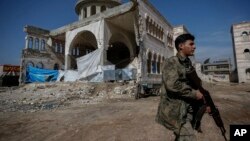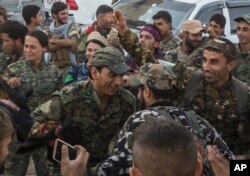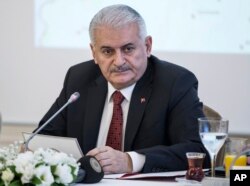The U.S.-led coalition battling the Islamic State (IS) is asking for a pause in fighting in Northwest Syria where the Turkish government and its allied Syrian militias are fighting Kurdish forces in the town of Afrin.
“We call on all parties to take measures to de-escalate violence, avoid endangering civilians, and maintain focus on the fight against Daesh,” U.S. Army Col. Thomas Veale, a spokesperson for the coalition told VOA, using the Arabic acronym for IS.
Veale said the call for the cessation of violence is in line with the UN Security Council’s vote last week calling for a 30-day break across Syria.
“The Coalition will stand by our SDF partners through a U.N.-led peace process in Syria,” he added.
The Syrian Democratic Forces (SDF) is an umbrella organization of several Syrian militias who played a key role in the U.S.-led fight against IS in Syria. Kurdish fighters, known as the People’s Protection Units or the YPG, are the backbone of the SDF.
“We call for international dialogue that reduces regional frictions and restores everyone’s focus to achieving the lasting defeat of Daesh, which has been and continues to be a significant threat to all our homelands,” Veale said.
Operational pause
Veale’s comments come on the heels of the Pentagon’s announcement Monday that the Turkish offensive in Afrin has led to an “operational pause” in eastern Syria where the Kurdish YPG fighters are fighting against IS. It said Kurdish fighters have started shifting attention to northwest Syria to repel the Turkish attacks.
The SDF on Tuesday said it was deploying around 1,700 members from frontlines against IS in the middle Euphrates river valley to Afrin in an effort to defend against the ongoing Turkish offensive in the region.
“Today we regretfully make a difficult decision of moving our fighters from the east of the Euphrates and the rural areas of Deir al-Zour, who are stationed in the face of terrorist threats, to the frontlines of Afrin,” Abu Omar al-Idlibi, an SDF commander, said in a press conference.
“We would not have taken this decision if it was not for the failure of the international community to restrain the Turkish aggression,” al-Idlibi added.
The Turkish air and ground operation, code-named Operation Olive Branch, started in January against the YPG. Ankara says the operation is to protect its borders from the group, which has gained control over large swaths of land across northern Syria.
Turkey considers the YPG a terrorist organization, alleging the group is an extension of the banned Kurdistan Workers’ Party, which has been fighting for Kurdish autonomy in Turkey for decades. The U.S. and EU also consider the PKK a terrorist group.
But the U.S. denies the connections between the PKK and the YPG and considers the YPG to be a key ally in the ongoing campaign against the Islamic State.
U.S stance on Afrin
Washington has repeatedly asked Turkey to show restraint and has warned that the assault on Afrin could hinder the efforts to drive IS completely out of Syria.
Last week, the U.S. State Department asked Turkey to suspend the operation. France and Germany have made similar demands to Ankara.
Those calls have been forcefully rejected by Turkish officials who say the resolution does not apply to their cross-border offensive.
“There some people confusing Operation Olive Branch that we have been conducting in Afrin with East Ghouta. It is obvious that the U.N. Council’s resolution refers to East Ghouta,” Turkish Prime Minister Binali Yildirim told the Turkish parliament last Thursday.
The U.N. resolution demands all parties to “cease hostilities without delay” across the country to allow “safe, unimpeded and sustained delivery of humanitarian aid and services and medical evacuations of the critically sick and wounded.”






